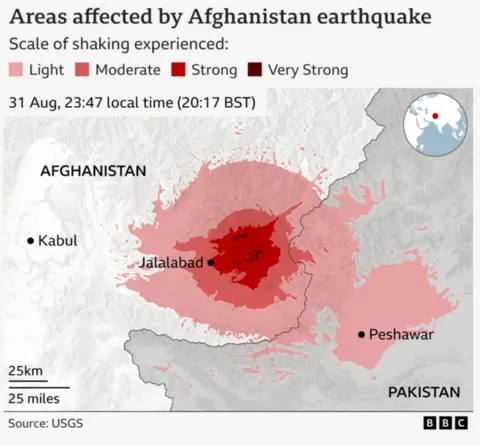Rescuers on helicopters are searching the ruins of remote villages in eastern Afghanistan for survivors of a powerful earthquake that has killed 800 people and injured 1,800 others.
Many are feared trapped under the rubble of their homes after the magnitude 6.0 earthquake struck on Sunday near the country's border with Pakistan.
Authorities searched by air for the second day on Tuesday as roads blocked with debris and the mountainous terrain in the affected areas made land travel difficult.
The Taliban government has appealed for international help. The UN has released emergency funds, while the UK has pledged £1m ($1.3m) in aid.
Sunday's earthquake was one of the strongest to hit Afghanistan in recent years. The country is very prone to earthquakes because it is located on top of a number of fault lines where the Indian and Eurasian tectonic plates meet.
In 2023, more than 1,400 people died after a series of 6.3-magnitude earthquakes hit western Afghanistan, near the city of Herat.
Survivors of Sunday's earthquake have been brought to a hospital in Jalalabad, which has been overwhelmed with hundreds of patients daily even before the disaster.
Locals like Mir Zaman recounted horrific experiences, indicating that many in his village lost their lives, with families buried under rubble. A poignant scene involved Maiwand, a young child suffering serious injuries, highlighting the tragic outcome of this disaster.
The earthquake struck as Afghanistan grapples with severe drought and an unprecedented hunger crisis. The ongoing situation is compounded by significant aid cuts this year, particularly from the US.
Britain's Foreign Secretary David Lammy confirmed that aid will be directed through experienced partners such as the UN Population Fund and the International Red Cross. India has provided 1,000 tents and pledged further support, while China and Switzerland have also committed assistance.
Survivors urgently require housing, shelter, and basic necessities as rescue operations continue.



















